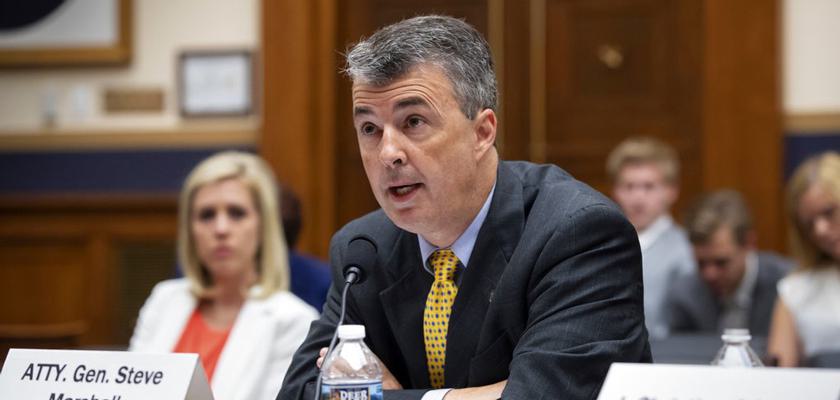Attorney General Steve Marshall announced Friday afternoon that the U.S. District Court for the Middle District of Alabama has lifted the injunction against Alabama’s Human Life Protection Act, making elective abortion illegal in Alabama.
“The State of Alabama’s emergency motion to lift the injunction and reinstate Alabama’s 2019 law, which prohibits abortions in most instances, has been granted,” Marshall said. “Both the federal district court and the plaintiffs recognized that there is no basis for a continued stay of the duly enacted law in light of the U.S. Supreme Court’s decision in Dobbs v Jackson Women’s Health Organization. Thus, Alabama’s law - making elective abortions a felony is now enforceable. Anyone who takes an unborn life in violation of the law will be prosecuted, with penalties ranging from 10 to 99 years for abortion providers.”
The law, passed in 2019 by the Alabama House and Senate and signed by Governor Kay Ivey on May 15, 2019, was supposed to take effect in November 2019. However, U.S. District Court Judge Myron Thompson issued an injunction stopping the implementation of the law in October of that year.
After the Supreme Court of the United States overturned Roe v. Wade Friday, Marshall said his office “immediately filed motions to dissolve those injunctions,” and Thompson lifted the injunction in his Montgomery court, saying the legal underpinning for the injunction “no longer exists” after the Supreme Court’s decision in Dobbs v. Jackson Women’s Health Organization overturned Roe.
Marshall said after the Supreme Court decision, “The issue of abortion now returns to the States — and the State of Alabama has unequivocally elected to be a protector of unborn life.
“Accordingly, I wish to immediately issue the following notices:
“Because neither the United States Constitution nor the Alabama Constitution provides a right to abortion, Alabama laws that prohibit abortion and that have not been enjoined by a court are in full effect. ... Any abortionist or abortion clinic operating in the State of Alabama in violation of Alabama law should immediately cease and desist operations.”
Marshall said the state would also move to lift other injunctions that blocked previous abortion restrictions, including a requirement for doctors who perform abortions to have hospital admitting privileges.
In 2018, voters agreed to amend the Alabama Constitution to say the state recognizes the “rights of unborn children” and “does not protect the right to an abortion or require the funding of abortion.”
Alabama’s law, considered one of the most sweeping in the country, bans abortion except in cases where there are lethal fetal anomalies, or where an abortion is deemed necessary to save the life of the mother. The law does not allow for exceptions for rape or incest.
Some Republican lawmakers have said they would like to see the state replace the 2019 ban with a slightly less stringent bill that would allow exceptions in cases of rape or incest. Proponents said the 2019 ban was deliberately strict in the hopes of sparking a court challenge to Roe.
State Sen. Chris Elliott (R-Josephine) said the 2019 law should stay as it is.
“I don't see the need for that at all," Elliott said in an interview on Mobile radio FM Talk 106.5. "It was a lengthy debate. It was a passionate debate. It was a heartfelt debate where tough issues were discussed and handled. And I think it's settled in Alabama. This opinion, it needs to be clear, returns that power to the states, which is where it should have always resided, with the states. In Alabama, we're a pro-life state. It is in our constitution. It is enshrined in the law. Women who want to go have an abortion, do it somewhere else because you're not going to be able to do it in Alabama."
The law does not ban procedures to end ectopic pregnancies or procedures in connection with stillbirths and does not address miscarriages nor does it punish women who have them or those who seek abortion procedures.
According to the Associated Press, Alabama’s three abortion clinics on Friday stopped providing abortions because of concerns of prosecution under a 1951 Alabama law, clinic owners and representatives said.
The Alabama legislature revised the state abortion law in September 1951, allowing fines ranging from $100 to $1,000 while reducing the crime from a felony to a misdemeanor and setting maximum time for imprisonment on conviction to a single year, a law that remains on the books.
At the Alabama Women’s Center for Reproductive Alternatives in Huntsville, the staff had to tell women in the waiting room Friday morning that they could not perform any more abortions that day. Some had come from as far away as Texas for an appointment.
“A lot of them just started breaking down crying. Can you imagine if you had driven 12 hours to receive this care in this state and you are not able to?” clinic owner Dalton Johnson said told the Associated Press. Patients were given a list of out-of-state places still doing abortions.
Marshall said he intends to maintain protections for anti-abortion groups that provide resources and services.
“Furthermore, any act of vandalism or violence against any crisis pregnancy center, church, or other pro-life entity in retaliation for today’s decision will be prosecuted by the Attorney General’s Office to the fullest extent of the law,” he said.
The Associated Press contributed to this story.
Don’t miss out! Subscribe to our newsletter and get our top stories every weekday morning










